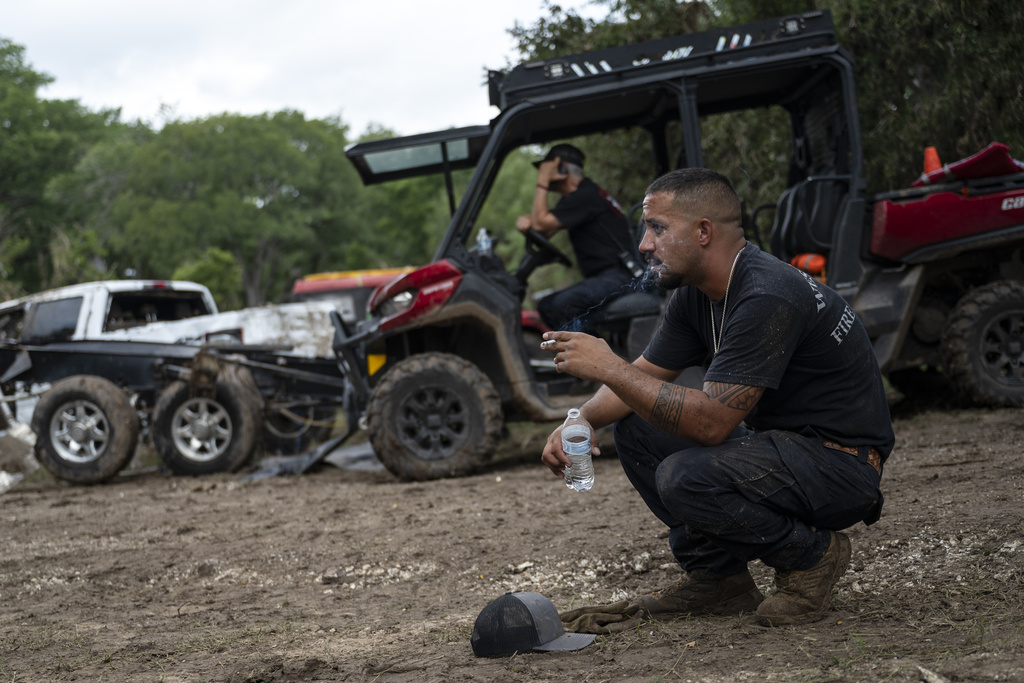These are deep Christian thoughts from two veteran Christian pastors tacking the difficult question that many ask when tragedy happens:
Where was God?
This is from Pastor Rich Bitterman with Cedar Ridge Baptist Church near Knoxville, Tennessee on social media X:
Where Was God in the Texas Flood?
The sandals are still by the door. Her toothbrush is dry. There are fingerprints on the car window that no one can bring themselves to wipe away.
She was seven.
On the Fourth of July, she slipped beneath the water and did not come back. She was not alone. Her sister was found close by, their fingers still laced together. As if one last act of love might hold the river back.
Sometimes, the sky just breaks open and nothing is ever the same. When time becomes before and after. When pain is not a page in someone else’s story, but the sound of your own heartbeat.
This is one of those moments. And what can be said now? What words can rise in a flood of pain so sudden, so wide, that entire families are washed into silence?
Still…we must speak. We must try. Not to explain away the ache.
Not to tidy up the tears. But to tell the truth, because silence leaves a vacuum, and in that vacuum, where truth stays quiet, shadows multiply: that this was meaningless, that God is cruel, that death always wins.
Let me speak, then, not as one above the sorrow but as one who believes there is a God who entered it.
The Ache We Cannot Escape
There is a question rising in the throat of every mother whose arms are empty tonight: Where was God?
If God is love, where was He when the river rose? If God is powerful, why didn’t He stop it? If God is wise, why did the storm come at all?
That question is not a sign of disbelief. It is a cry of faith that feels betrayed. It is the heart’s protest that says: I know You’re there, but I cannot understand You.
And that’s important.
Atheism has no right to ask why. It has no category for meaning. But grief demands an answer because we know, in our bones, that things are not as they should be. We rage at death because somewhere deep in our soul we remember Eden. We remember a garden where death did not belong.
We rage against death because something in us remembers how it used to be. It is evidence. The way your heart recoils at caskets and coffins is not weakness…it is a whisper of the world we lost.
And the world we long for.
The Suffering That Shook the Heavens
But here’s the question grief never expects: What if God grieved first?
What if He didn’t stand above suffering, but walked straight into it?
He did. His name is Jesus.
He didn’t come as a king in gold. He came as a child in straw. Born to peasants too poor to afford a proper sacrifice. Raised in a forgotten town. Misunderstood, slandered, betrayed, beaten. And then He was crucified.
You’ve heard the story so often, maybe it doesn’t shake you anymore. But let it.
The Eternal Son of God, hanging naked, bleeding before His mother. Not just dying. Being judged. Treated as if He had committed every sin of everyone who would ever believe. The One who knew no sin became sin. And the Father turned His face away.
“My God, my God, why have You forsaken Me?”
That was the cry that echoed across the sky. That was the moment the earth trembled. That was the night sorrow pierced heaven itself.
And that, dear reader, is the only reason we can speak hope into tragedy.
Because three days later, the tomb cracked open. And death blinked.
He is alive. Still scarred, but alive. And one day, every grave will lose its grip. Every river will be rolled back. And every child in Christ will rise.
The Suffering God Allows and Enters
But what about now? What about the parent who holds a balloon they meant to give their daughter but now releases into the sky with tears?
There is a kind of suffering God allows, so that we might wake up. When tragedy comes, the wrong question is, “Why them?” The harder and holier question is: “Why not me?”
We live in a world we did not make, with a breath we did not earn, in bodies we did not design. Every heartbeat is borrowed. And every moment is mercy.
Jesus once spoke of a tower that fell and crushed eighteen people. His words were sharp and strange: “Do you think they were worse sinners than all others? No. But unless you repent, you will all likewise perish.”
He wasn’t being cruel. He was being clear. Suffering is a trumpet blast: turn around. Come home.
There is another kind of suffering God gives. The suffering of conviction.
When the Spirit of God shows you that your greatest problem is not what’s happened to you, but what lives inside you. When your eyes open to the weight of your own sin, it hurts. It stings. But it is the pain that leads to healing. The ache that leads to a Savior.
There is yet another kind of suffering…one reserved for God’s children. It is not punishment. It is preparation.
Job lost everything. Children. Wealth. Health. Dignity. His friends blamed him. His wife told him to curse God. He sat in ashes scraping his skin with pottery shards.
And then God spoke.
Not to answer every question, but to remind Job of who He is. To pull Job out of his pain not with explanations, but with presence.
“Where were you when I laid the foundation of the earth?”
Job never got the why. But he saw the Who. And it was enough.
The cross tells us this: God never wastes suffering. For the believer, every sorrow chisels away what is not like Christ. Every wound makes room for glory. Every trial becomes a testimony. Even if no one else understands, He does.
What We Must Do
Now…hear me clearly: We do not just sit with suffering. We move.
Jesus fed the hungry. He touched the leper. He wept at funerals. And He calls us to do the same.
Grief is not a reason to retreat. It is a reason to love harder.
We must hold the hand of the widow. Sit with the father who cannot speak. Bring meals. Write cards. Show up. Keep showing up. And when the words won’t come, we weep with those who weep. That, too, is holy work.
But we do more. We speak.
We tell the world what Texas still needs to hear: Death is not the end. Loss is not meaningless. And there is one name under heaven by which we must be saved.
His name is Jesus.
He welcomes sinners. He binds the broken. He walks into funeral homes and whispers, “She is not gone. She is with Me.”
To every family grieving this week, I say with trembling: He is there. In the quiet. In the storm. In the empty bedroom. He knows. He sees. He weeps.
And He will make all things new. We grieve. But not as those without hope. Because the hands that hold your sorrow are scarred.

This message is from Pastor Stephen Cox with Bible Baptist Church, Simpsonville, SC
“God will not give you more than you can handle”—is not biblical.
Recently, someone said this to me and immediately I thought, “That sounds good but that is not Biblical at all.” Phrases like this one and other Christian cliches need to be examined against God’s Word.
Here is why the phrase “God will not give you more than you can handle” is not Biblical:
1. The Phrase Is a Misapplication of 1 Corinthians 10:13 Many people think this phrase is in the Bible because they confuse it with: “There hath no temptation taken you but such as is common to man: but God is faithful, who will not suffer you to be tempted above that ye are able…” 1 Corinthians 10:13 This verse refers specifically to temptation—not to trials, suffering, or burdens. It says that God will always make a way to escape in times of temptation so we can choose rightly. It does not say that God won’t let us face more than we can bear in life.
2. Scripture Repeatedly Shows God Does Allow More Than We Can Handle God allows His people to be overwhelmed beyond their strength so they will depend on Him, not themselves. Consider the Apostle Paul: “We were pressed out of measure, above strength, insomuch that we despaired even of life: But we had the sentence of death in ourselves, that we should not trust in ourselves, but in God which raiseth the dead.” 2 Corinthians 1:8–9 Paul is clear—he was burdened beyond his ability to bear it. Why? So that he would learn to trust God and not his own strength.
3. The Christian Life Is About God’s Strength, Not Ours God doesn’t call us to handle everything on our own. Quite the opposite—He tells us to cast our cares upon Him (1 Peter 5:7), to come unto Him for rest (Matthew 11:28), and to find our strength in His grace (2 Timothy 2:1). If we could handle it all, why would we need a Savior?
4. The Danger of the Phrase • It sounds comforting, but it can lead to guilt and despair: “If God won’t give me more than I can handle, then what’s wrong with me? Why am I drowning?” • It centers strength on you instead of on God. That’s not biblical Christianity—that’s moralism and self-reliance.
The Better Truth Is: “God will often give you more than you can handle, but never more than He can handle.” Or put another way: “God doesn’t call you to be strong; He calls you to trust His strength.”

